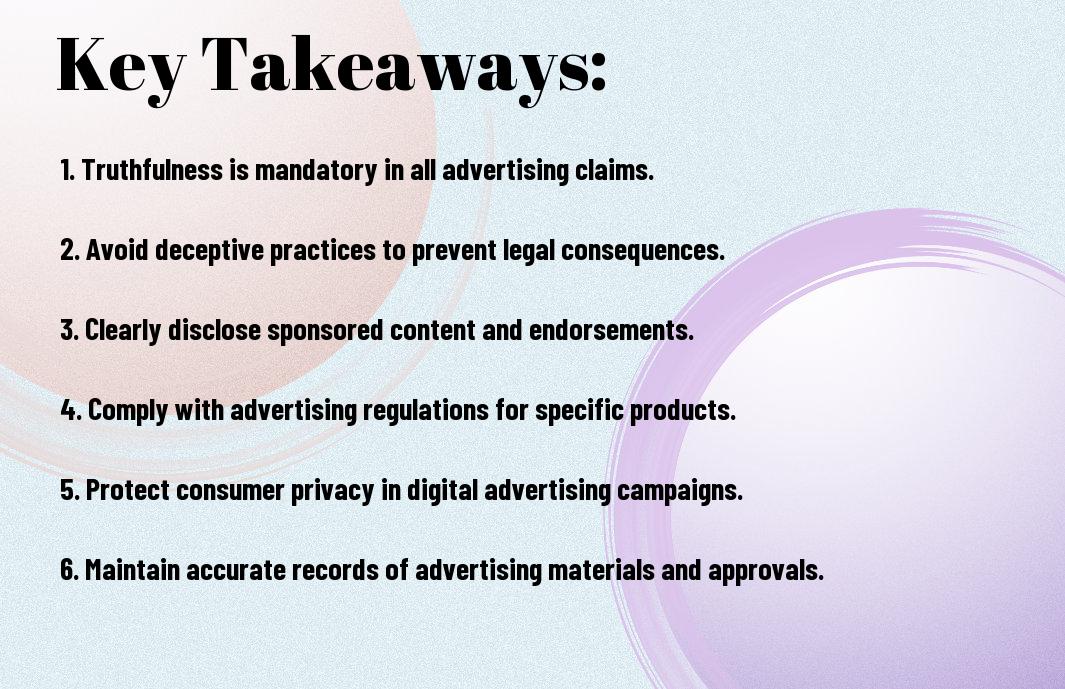Advertising Law: Unlock What Every Advertiser and Agency Must Know
Most advertisers and agencies face a complex landscape when navigating advertising law, where compliance is important to avoid costly legal penalties and protect their brand reputation. You must understand key regulations governing truth in advertising, endorsements, and data privacy to ensure your campaigns remain both effective and lawful. Ignorance can lead to significant risks, but mastering these legal frameworks offers a chance to leverage advertising opportunities confidently. This guide will help you unlock the important legal knowledge you need to safeguard your efforts and optimize your advertising strategy responsibly.
Key Takeaways:
- Advertising law governs how advertisements must be truthful, not misleading, and supported by evidence to protect consumers and maintain fairness in the marketplace.
- Advertisers and agencies need to understand regulations related to claims, endorsements, disclaimers, and comparative advertising to avoid legal pitfalls.
- Compliance with privacy laws and data protection regulations is imperative when collecting and using consumer information for targeted advertising.
- Intellectual property rights, including trademarks and copyrights, must be respected to prevent unauthorized use of protected content in ads.
- Specific industries, such as alcohol, tobacco, and pharmaceuticals, face additional advertising restrictions that agencies must be aware of.
- Regulatory bodies, like the Federal Trade Commission in the U.S., actively monitor advertising practices and can impose penalties for violations.
- Contracts between advertisers and agencies should clearly outline roles, responsibilities, and compliance obligations to mitigate risks and ensure accountability.

Overview of Advertising Law
Definition and Scope
Around the world, advertising law governs the practices and content of advertisements to ensure they are truthful, not misleading, and fair to consumers. For you as an advertiser or agency, understanding this legal framework is crucial to avoid penalties and maintain consumer trust. Advertising law covers a wide array of practices, including claims about products, comparative advertising, endorsements, and digital marketing.
Moreover, the scope of advertising law extends to multiple media platforms such as television, radio, print, online, and social media. This means your campaigns must comply with different regulations depending on where and how you advertise. The law protects consumers by regulating deceptive advertisements, but it also safeguards your business by setting clear boundaries on what is acceptable promotion.
Historical Context of Advertising Regulations
Above all, advertising regulations have evolved significantly from the early days when advertising was largely unregulated. Initially, misleading advertisements were widespread, causing harm to consumers and businesses. Over time, governments recognized the need to protect the public and introduced laws to curb false claims and deceptive marketing tactics.
These early efforts laid the foundation for the complex framework of rules you deal with today. The development of consumer protection agencies and advertising standards authorities marked milestones in shaping fair advertising practices that balance the interests of all parties involved.
It is important to see how this historical backdrop influences current laws, emphasizing transparency, honesty, and accountability in your advertising efforts.
Key Regulatory Bodies and Their Roles
Across different jurisdictions, various regulatory bodies oversee and enforce advertising law to ensure compliance. You may encounter institutions such as the Federal Trade Commission (FTC) in the United States, the Advertising Standards Authority (ASA) in the UK, and similar authorities worldwide. These organizations establish codes of conduct, investigate complaints, and impose sanctions against violators.
These regulatory bodies not only protect consumers from misleading advertisements but also serve to protect your business’s reputation by enforcing standards aimed at fair competition. Being familiar with their guidelines and processes helps you navigate advertising law proactively.
And while these organizations vary in structure and enforcement powers, their shared goal is to create a trustworthy advertising environment that benefits you, your customers, and the industry as a whole.

Truth in Advertising
The Importance of Truthfulness
You must understand that truthfulness in advertising is more than just a regulatory requirement; it is the foundation of consumer trust and brand reputation. Besides maintaining compliance with advertising laws, truthful advertising ensures your audience feels confident in your products or services, fostering long-term loyalty and positive word-of-mouth.
You also benefit by avoiding the pitfalls of deceptive practices, which can erode public confidence and damage your business. When you commit to transparency and honesty, your campaigns become not only legally sound but also ethically compelling.
Examples of Misleading Advertising
You will encounter various forms of misleading advertising that can misinform or deceive consumers. Above all, these can include exaggerated claims about product effectiveness, hidden fees, or misleading comparisons with competitors that do not reflect the true facts.
Above all, you should recognize that using vague or ambiguous language to imply benefits that are not substantiated can also fall into deceptive practices. Your role involves scrutinizing every detail of your advertising to ensure clarity and honesty.
Misleading advertisements frequently arise from a failure to disclose important limitations or conditions associated with an offer. This can lead consumers to make decisions based on incomplete or incorrect information, which puts you at risk of legal action and reputational loss.
Legal Consequences of False Claims
You need to be aware that false claims in advertising can result in serious legal consequences. On the regulatory front, government agencies such as the Federal Trade Commission (FTC) in the US or similar authorities worldwide actively investigate and prosecute deceptive advertising practices through fines and sanctions.
On a civil level, your business might face lawsuits from consumers or competitors, which can lead to costly settlements, injunctions, or mandatory corrective advertising. These outcomes not only affect your finances but can severely impact your market position and credibility.
Advertising that includes false or misleading claims exposes you to enforcement actions designed to protect consumers and uphold fair competition. Adopting stringent internal review processes and compliance checks can safeguard your campaigns from these risks.
Federal Trade Commission (FTC) Regulations
Overview of FTC Guidelines
Keep in mind that the Federal Trade Commission (FTC) is the principal regulatory body overseeing advertising practices in the United States. Among its many responsibilities, the FTC establishes guidelines to ensure that advertisements are truthful, not misleading, and backed by evidence. These guidelines apply broadly across all media and industries, so you must familiarize yourself with them to avoid compliance issues.
Among the core principles you need to understand is that any claim you make in your advertising must be substantiated before it reaches the consumer. The FTC expects advertisers and agencies like yours to maintain integrity and transparency, preventing deceptive or unfair practices. Failure to comply can lead to enforcement actions, including fines and mandatory corrective advertising, which could impact your reputation and bottom line.
Endorsements and Testimonials
Around endorsements and testimonials, the FTC requires that these reflect honest opinions, findings, beliefs, or experiences of the endorser. If you use endorsements, you must ensure that they are reliable and representative of the typical consumer’s experience or disclose if results are not typical.
Around your obligations in this area, it’s important to note that if an endorser has a material connection to your brand, such as being paid, receiving free products, or having a personal relationship, that connection must be clearly disclosed. This transparency helps consumers evaluate the credibility of the endorsement and protects your advertising from claims of deception or unfairness.
An overview of these regulations highlights that the FTC looks closely at how endorsements and testimonials are presented. Your adherence to these rules can bolster consumer trust and safeguard your brand from legal risks associated with misleading endorsements.
Disclosures in Advertising
With disclosures in advertising, clarity and prominence are your priorities. The FTC mandates that disclosures be clear, conspicuous, and placed as close as possible to the relevant claim to ensure that consumers easily see and understand them. This means your disclaimers cannot be buried in fine print or placed where consumers are unlikely to notice.
With your advertising campaigns, you should also be aware that disclosures must be understandable to your target audience, considering factors like language, reading level, and platform. Ignoring these requirements can lead to serious penalties and damage your credibility. You should evaluate each campaign’s context to determine the best way to present disclosures effectively.
Federal enforcement of these disclosure rules shows how important they are in maintaining honest communication with consumers. Ensuring your advertisements incorporate well-executed disclosures not only mitigates risk but also reinforces consumer confidence in your messaging.
Intellectual Property Considerations
Trademark Law and Its Impact on Advertising
Your advertising campaigns must navigate the complexities of trademark law to avoid potentially costly legal battles. Between the use of logos, slogans, and brand names, trademarks serve as powerful identifiers of source and quality for products and services. When you incorporate a trademarked element into your advertisements, it’s crucial to ensure you have the right to use it. Otherwise, you may face allegations of trademark infringement, which can result in injunctions, damages, and the tarnishing of your reputation.
Beyond avoiding infringement, understanding trademark law allows you to strategically leverage your own marks to build brand equity. You should also be mindful of how trademarks owned by others are portrayed to prevent misleading associations or unfair competition. In advertising, using trademarks accurately and lawfully protects your agency and clients from legal exposure and elevates your messaging’s credibility.
Copyright Issues in Advertisements
At the heart of many disputes in advertising lies copyright protection for creative works. Whether it’s a catchy jingle, a compelling photograph, or a clever script, copyrights grant exclusive rights to creators, including the right to reproduce and distribute their work. When you use copyrighted material in your ads, obtaining licenses or permissions is mandatory unless the content falls under specific exceptions. Unauthorized use can lead to litigation, statutory damages, and forced removal of campaigns.
Understanding the scope of copyright protection also empowers you to create original content or properly license third-party works, enhancing your advertisements’ impact without legal encumbrances. Paying close attention to rights management underscores your professionalism and shields your projects from significant financial and operational risks.
Hence, integrating diligent copyright clearance protocols into your advertising workflow becomes a strategic move to maintain compliance and foster innovation in your creative outputs.
Fair Use vs. Infringement
To navigate the delicate balance between fair use and infringement, you need to assess how copyrighted content is employed within your advertisements. Fair use provides limited allowances for uses like commentary, criticism, or parody, which can sometimes justify the use of copyrighted material without permission. However, the boundaries of fair use are often ambiguous, depending on factors like the purpose of use, the amount of content used, and the effect on the market value of the original work.
When you rely on fair use in your campaigns, a careful legal analysis is paramount to avoid costly missteps. Overstepping can provoke infringement claims that harm your clients and your agency’s credibility. Conversely, skillful application of fair use can enrich your advertising with culturally resonant references and creative expression.
In fact, understanding fair use criteria can enable you to defend against potential infringement claims effectively and make informed decisions that maximize your advertising’s creative freedom without crossing legal lines.
Privacy Regulations in Advertising
Consumer Data Protection Laws
Many advertising professionals must navigate a complex landscape of consumer data protection laws designed to shield individuals from misuse of their personal information. These laws, including the General Data Protection Regulation (GDPR) in Europe and the California Consumer Privacy Act (CCPA) in the United States, impose stringent requirements on how you collect, store, and utilize consumer data. Violating these regulations can result in significant fines and damage to your brand’s reputation, so understanding their scope and application is important for your campaigns.
Against this backdrop, you are expected to maintain transparency about your data practices by informing consumers about what data is being collected and for what purpose. Implementing robust data security measures not only fulfills legal mandates but also fosters consumer trust, which enhances your advertising effectiveness.
The Role of Consent in Advertising
At the core of many privacy regulations lies the principle that you must obtain explicit consumer consent before processing their personal data for advertising purposes. This consent must be informed, specific, and freely given, which means you cannot use pre-checked boxes or obscure terms in your privacy policies. Ensuring that consent mechanisms are clear and accessible helps avoid legal exposure and promotes ethical advertising practices.
At the same time, you should provide consumers with meaningful options to withdraw consent easily, which is a right guaranteed under many regulations. By respecting these rights, you demonstrate accountability and build long-term relationships that can benefit your advertising outcomes.
Consequently, the role of consent is not just a regulatory hurdle but a fundamental element of consumer respect and engagement. By integrating consent management into your workflows, you empower consumers while safeguarding your campaigns against compliance risks.
Behavioral Targeting and Compliance
Protection of consumer privacy becomes particularly sensitive when it comes to behavioral targeting. This advertising technique relies on tracking user behavior across websites and apps to deliver personalized ads, which can raise significant privacy concerns. To comply, you must ensure that your tracking practices align with legal frameworks, often requiring prior consumer consent and clear disclosure about data usage.
Implementing privacy-by-design principles helps you meet these compliance requirements by embedding data protection measures into your advertising technologies and strategies from the outset. Failure to adhere to these standards can result in regulatory penalties and consumer backlash, threatening the viability of your targeted campaigns.
Laws governing behavioral targeting continually evolve, so staying informed about updates and emerging standards is vital. By proactively adjusting your practices, you maintain compliance and uphold consumer trust while leveraging the advantages of personalized advertising.

International Advertising Laws
Despite the global nature of advertising, international advertising laws vary significantly across regions, requiring advertisers and agencies to navigate a complex landscape. Understanding these laws is vital for you to create compliant campaigns that resonate with diverse audiences while avoiding legal pitfalls.
Comparative Overview of Global Advertising Regulations
Around the world, advertising regulations reflect distinct cultural, legal, and economic contexts. To help you grasp these differences, the table below highlights key features from major jurisdictions.
| Region | Regulatory Approach & Key Features |
|---|---|
| United States | Primarily overseen by the Federal Trade Commission (FTC), focusing on truth-in-advertising, prohibiting deceptive claims, and requiring substantiation. |
| European Union | The EU enforces the Unfair Commercial Practices Directive with a strong emphasis on consumer protection, privacy, and data considerations under GDPR. |
| China | Advertising Law focuses on prohibiting misleading ads and regulating content to align with social values and government policies. |
| Australia | The Australian Competition and Consumer Commission (ACCC) enforces strict guidelines against misleading advertising and emphasizes voluntary codes for ethical advertising. |
| Brazil | Strict regulations target false advertising and promote consumer rights, with enforcement from the National Council for Advertising Self-Regulation (CONAR). |
By comparing these frameworks, you gain insight into how diverse and specific international rules can be, which impacts how you craft and position your messages globally.
Cross-Border Advertising Challenges
Advertising across borders introduces significant challenges due to differing legal standards, cultural sensitivities, and enforcement mechanisms. You must adapt your campaigns to comply not only with your home country’s laws but also with those of the target market to avoid penalties.
One of the most persistent obstacles is the disparity in advertising content restrictions. What may be acceptable in one country could be illegal in another, especially when it comes to claims about product safety, health benefits, or endorsements. Moreover, language nuances add layers of complexity, requiring precise translations that maintain compliance and effectiveness.
Due to these complexities, many agencies and advertisers enlist local legal experts. This collaboration ensures that your advertisements align with regional regulations and cultural norms, ultimately safeguarding your brand reputation and fostering consumer trust.
Implications of Non-Compliance
Laws governing advertising carry strong enforcement provisions internationally. Non-compliance can lead to severe consequences including hefty fines, mandatory withdrawals or corrections of ads, and damage to your company’s credibility. You face the risk of legal action that might result in increased scrutiny from regulators and adverse publicity.
Moreover, breaches can trigger consumer backlash, eroding trust and loyalty which are vital for long-term success. To protect your brand, it is vital that you invest in ongoing training and compliance monitoring mechanisms to stay ahead of evolving rules.
The financial impact of non-compliance often outweighs any short-term gains from cutting corners. Ensuring you understand and adhere to international advertising laws not only mitigates risk but positions you as a responsible market player respected by consumers and regulators alike.
Future Trends in Advertising Law
Emerging Technologies and Their Legal Implications
Now, as you explore the rapidly evolving world of advertising, it’s vital to understand how emerging technologies are reshaping legal frameworks. Below the surface of innovation lies a complex web of regulations designed to protect consumer rights while fostering creative marketing strategies. Technologies like augmented reality (AR), virtual reality (VR), and blockchain are not just making advertisements more interactive and engaging, but they also introduce new concerns about data privacy, content authenticity, and intellectual property.
Below these advancements, expect increased scrutiny over how advertisers collect and utilize consumer data through apps and devices. The legal implications stretch far beyond compliance; you must anticipate significant regulatory challenges if you fail to address issues related to user consent and transparency. Preparing for these changes means not only adapting your advertising practices but also aligning them with evolving legal interpretations about digital interactions and consumer protection.
The Role of Artificial Intelligence in Advertising
The use of artificial intelligence (AI) in advertising is transforming how campaigns are designed, targeted, and optimized. The integration of AI tools allows you to analyze vast data sets for personalized ads while automating content creation and customer interaction. However, the legal environment surrounding AI is still developing, raising questions about liability, bias, and the ethical use of automated decision-making systems.
The increased reliance on AI means that advertisers must navigate a delicate balance between innovation and compliance. As you implement AI-driven tools, it’s vital to consider how algorithms may unintentionally discriminate or manipulate consumer choices, potentially leading to legal challenges under consumer protection laws. Ensuring transparency in AI operations and safeguarding against unfair practices will be a key focus of regulators worldwide.
A deeper understanding of the AI landscape will empower you to leverage its benefits while minimizing legal risks. This means staying informed about evolving policies, such as those addressing data usage, algorithmic transparency, and potential intellectual property concerns linked to AI-generated content.
Anticipated Legal Changes and Adaptations
After observing recent trends, you should expect significant shifts in advertising law designed to keep pace with technological innovation and changing consumer expectations. Governments and regulators are poised to introduce stricter rules on digital advertising, particularly around data protection, influencer marketing disclosures, and deceptive advertising practices. These anticipated changes aim to enhance accountability and protect consumers in an increasingly digital marketplace.
The future landscape will demand that you adapt quickly, integrating new compliance measures into your advertising strategies and agency operations. The adaptability you demonstrate today will position you advantageously as laws become more rigorous and enforcement intensifies. Staying ahead of regulatory developments requires not only vigilance but also proactive collaboration with legal experts to interpret and implement new requirements effectively.
But, just as regulations tighten, there will also be opportunities. Evolving laws could clarify ambiguous areas of advertising, offering you greater certainty in areas like cross-border campaigns and digital content standards. Embracing these changes with a forward-thinking mindset will allow you to reinforce trust with your audience while navigating the legal complexities confidently.
Summing up
Presently, understanding Advertising Law is necessary for you as an advertiser or agency to navigate the complexities of marketing and promotion. By familiarizing yourself with the legal frameworks that govern advertising practices, you can effectively protect your brand from potential legal pitfalls while ensuring your campaigns remain truthful and ethical. This knowledge empowers you to create advertisements that resonate with your audience without crossing regulatory boundaries, fostering trust and credibility in your communications.
As you move forward with your advertising strategies, being well-versed in relevant laws will enable you to identify risks before they escalate, manage compliance smoothly, and respond adeptly to any legal challenges. Incorporating these legal insights into your daily operations isn’t just about avoiding penalties; it’s about strengthening your overall approach and positioning your agency or brand for sustainable success in a competitive marketplace.
FAQ
Q: What are the key legal requirements advertisers must follow to ensure their advertisements are compliant?
A: Advertisers must adhere to truth-in-advertising laws, which require that advertisements be truthful, not misleading, and substantiated. They also need to comply with specific regulations regarding disclosures, endorsements, and the use of comparative claims. Additionally, advertisers should be aware of jurisdiction-specific regulations such as those enforced by the Federal Trade Commission (FTC) in the US, which oversee unfair or deceptive acts or practices.
Q: How can agencies effectively manage liability when creating advertisements for clients?
A: Agencies should clearly define responsibilities in their contracts with clients and ensure all claims in advertisements are supported with evidence. Implementing a robust review and approval process before publication helps prevent potential legal issues. It is also advisable to stay updated with advertising laws and seek legal counsel when creating high-risk or novel campaigns to minimize liability.
Q: What types of advertising content are typically restricted or prohibited by law?
A: Advertising laws often restrict or prohibit content that is false, deceptive, or misleading. Content promoting illegal products or services, offensive or discriminatory material, and advertisements targeting children with inappropriate messages are usually regulated. Additionally, certain sectors, such as tobacco, alcohol, and pharmaceuticals, face strict limitations on how they may advertise, including mandatory health warnings.
Q: How do disclosure requirements impact influencer marketing and endorsements?
A: Influencers and endorsers must disclose any material connections with brands to ensure transparency for consumers. This includes sponsorships, free products, or payments. Disclosures should be clear and conspicuous so that the audience easily understands the nature of the relationship. Failure to disclose properly can lead to regulatory enforcement actions and damage to reputation.
Q: What should advertisers know about the use of intellectual property in their campaigns?
A: Advertisers must secure proper licenses or permissions before using copyrighted materials, trademarks, or patented technologies in their advertisements. Unauthorized use can lead to infringement claims and legal penalties. It is important to verify ownership and rights for any creative assets used and to respect competitors’ brand identifiers to avoid confusion or dilution.
Q: How can agencies ensure compliance with international advertising laws when operating across borders?
A: Agencies should conduct detailed research on the advertising regulations in each market where the advertisement will run. These laws can vary significantly between countries regarding language, claims substantiation, cultural sensitivities, and prohibited content. Collaborating with local legal experts and tailored compliance checklists can help navigate this complex landscape effectively.
Q: What role does data privacy play in advertising law compliance?
.A: Data privacy laws regulate how advertisers collect, use, and store consumer information. Advertisers must ensure their data collection practices, particularly via digital advertising, comply with laws such as the GDPR in Europe or the CCPA in California. Transparency with consumers about data usage, obtaining consent where required, and safeguarding data against breaches are vital components of compliance.
Authored by Team, Dinet Comms

